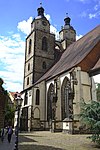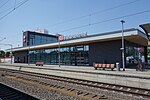Wittenberg ( WIT-ən-burg, VIT-, German: [ˈvɪtn̩bɛʁk] (listen); Low Saxon: Wittenbarg; meaning White Mountain; officially Lutherstadt Wittenberg (Luther City Wittenberg)), is the fourth largest town in Saxony-Anhalt, Germany. Wittenberg is situated on the River Elbe, 60 kilometers (37 mi) north of Leipzig and 90 kilometers (56 mi) south-west of Berlin, and has a population of 46,008 (2018).
Wittenberg is famous for its close connection with Martin Luther and the Protestant Reformation, for which it received the honourific Lutherstadt. Several of Wittenberg's buildings are associated with the events, including a preserved part of the Augustinian monastery in which Luther lived, first as a monk and later as owner with his wife Katharina von Bora and family, considered to be the world's premier museum dedicated to Luther. Wittenberg was also the seat of the Elector of Saxony, a dignity held by the dukes of Saxe-Wittenberg, making it one of the most powerful cities in the Holy Roman Empire.
Today, Wittenberg is an industrial centre and popular tourist destination, best known for its intact historic center and various memorial sites dedicated to Martin Luther and Philip Melanchthon. The buildings associated with those two figures were added to the UNESCO world heritage list in 1996, along with other sites in Eisleben, because of their religious significance and testimony to one of the most influential movements of medieval Europe.






